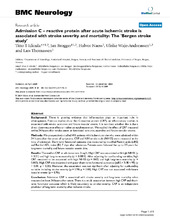| dc.contributor.author | Idicula, Titto T. | en_US |
| dc.contributor.author | Brøgger, Jan C. | en_US |
| dc.contributor.author | Næss, Halvor | en_US |
| dc.contributor.author | Waje-Andreassen, Ulrike | en_US |
| dc.contributor.author | Thomassen, Lars | en_US |
| dc.date.accessioned | 2009-12-16T09:39:49Z | |
| dc.date.available | 2009-12-16T09:39:49Z | |
| dc.date.issued | 2009-04-28 | eng |
| dc.Published | BMC Neurology 9(18) | en |
| dc.identifier.issn | 1471-2377 | |
| dc.identifier.uri | https://hdl.handle.net/1956/3685 | |
| dc.description.abstract | Background: There is growing evidence that inflammation plays an important role in atherogenesis. Previous studies show that C-reactive protein (CRP), an inflammatory marker, is associated with stroke outcomes and future vascular events. It is not clear whether this is due a direct dose-response effect or rather an epiphenomenon. We studied the effect of CRP measured within 24 hours after stroke onset on functional outcome, mortality and future vascular events. Methods: We prospectively studied 498 patients with ischemic stroke who were admitted within 24 hours after the onset of symptoms. CRP and NIH stroke scale (NIHSS) were measured at the time of admission. Short-term functional outcome was measured by modified Rankin scale (mRS) and Barthel ADL index (BI) 7 days after admission. Patients were followed for up to 2.5 years for long-term mortality and future vascular events data. Results: The median CRP at admission was 3 mg/L. High CRP was associated with high NIHSS (p = 0.01) and high long-term mortality (p < 0.0001). After adjusting for confounding variables, high CRP remained to be associated with high NIHSS (p = 0.02) and high long-term mortality (p = 0.002). High CRP was associated with poor short-term functional outcomes (mRS > 3; BI < 95) (p = 0.01; p = 0.03). However, the association was not significant after adjusting for confounding variables including stroke severity (p = 0.98; p = 0.88). High CRP was not associated with future vascular events (p = 0.98). Conclusion: Admission CRP is associated with stroke severity and long-term mortality when measured at least 24 hours after onset. There is a crude association between high CRP and shortterm functional outcome which is likely secondary to stroke severity. CRP is an independent predictor of long-term mortality after ischemic stroke. | en_US |
| dc.language.iso | eng | eng |
| dc.publisher | BioMed Central | eng |
| dc.rights | Attribution CC BY | eng |
| dc.rights.uri | http://creativecommons.org/licenses/by/2.0/ | eng |
| dc.title | Admission C – reactive protein after acute ischemic stroke is associated with stroke severity and mortality: The 'Bergen stroke study' | en_US |
| dc.type | Peer reviewed | |
| dc.type | Journal article | |
| dc.description.version | publishedVersion | en_US |
| dc.rights.holder | Idicula et al; licensee BioMed Central Ltd. | |
| dc.identifier.doi | https://doi.org/10.1186/1471-2377-9-18 | |
| dc.identifier.cristin | 350810 | |
| dc.subject.nsi | VDP::Medisinske Fag: 700::Klinisk medisinske fag: 750::Nevrologi: 752 | nob |

